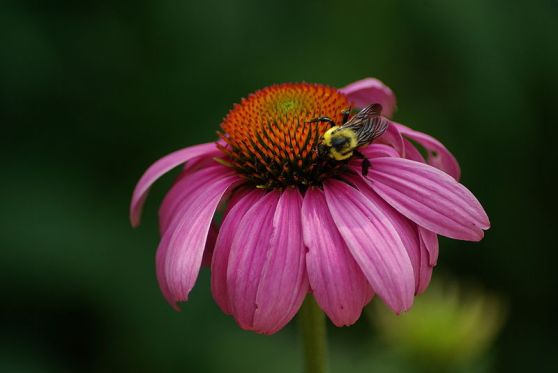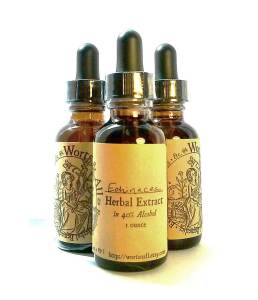 The best way to get to know an herbal medicine is to still yourself and feel its effects in your body. Pay excruciatingly close attention. Herbs work in mysterious and subtle ways, so distractions really will drown out the little sensations that are often a sign of big medicine. I thought I’d describe my most recent experience with this so you can see what it’s like if you’ve never done this before. Your mileage may vary but the general effects of an herb are consistent.
The best way to get to know an herbal medicine is to still yourself and feel its effects in your body. Pay excruciatingly close attention. Herbs work in mysterious and subtle ways, so distractions really will drown out the little sensations that are often a sign of big medicine. I thought I’d describe my most recent experience with this so you can see what it’s like if you’ve never done this before. Your mileage may vary but the general effects of an herb are consistent.
 I recently made some Echinacea tincture and in a rare moment of peace and quiet I let it do its thing…
I recently made some Echinacea tincture and in a rare moment of peace and quiet I let it do its thing…
Echinacea is a diffusive lymphatic, so you know right out of the box that it is going to get stagnant fluids of the body moving. I wrote about stagnant waters previously. The taste of a diffusive herb is really a combination of taste and sensation–Echinacea is strongly diffusive and makes your tongue tingly and a little numb. That was the first thing I felt. Then I noticed extra tingling where I had bitten the inside of my cheek a day or two before.
I next began feeling little jabs–not really strong enough to call them painful, but just enough to get my attention–in the sinuses on the right side of my head, where I had some congestion. Meanwhile on the left side I felt a downward draining sensation and some little twinges in my left ear. I felt some moisture in both ears.
Next I started to feel some twinges around my liver. Again, not enough to call it pain, just minor sharpish sensations.
My intuition and what I know of Echinacea as a lymphatic tells me that two things were happening: First, as lymphatics do, Echinacea was stimulating the movement of fluids in the body. This was the cause of the downward draining feeling and the release of moisture in my ears. Clearly there was more dampness in my sinuses than I had realized. It also caused the twinges in my liver, as anything in the bodily water economy that needs purifying will ultimately be sent to the liver for detox.
Secondly, the Echinacea seemed to be especially active in areas where there was some infection–the place where I bit my cheek, my sinuses. At present this is just an early impression and I would like to experiment some more to see if it continues. Even though these were very mild infections if any, I found it striking that Echinacea “knew” right where to go. But it is not unexpected for Echinacea, which is the medicine for acute infections par excellence. According to Matthew Wood’s Book of Herbal Wisdom, Echinacea was called “toothache root” by Native Americans, signifying that they found it particularly useful for dental infections.
I took a half dropper of Echinacea each morning for a few days (only one dose per day). The next symptom I noticed was a very mild case of acne. I had teenage acne but other than the odd pimple now and again, I am not subject to skin eruptions. But I developed nearly invisible pinpoint size acne on my nose and forehead that lasted a couple of days. I think this was a result of internal heat clearing through the skin.
I had one day of not feeling so hot, and on that day I probably quadrupled my dose of Echinacea. To tell the truth I just wanted to see what would happen. I thought if I had actually caught a bug, the Echinacea would help, and if not, I would learn something.
Although I had previously been warned that lymphatic herbs can dredge up stuck emotions as well as stagnant fluids, I had totally forgotten that little piece of information. So I was rather surprised when, over the next few days–after I had stopped taking the tincture–repressed emotions that were so deeply buried that I didn’t even know they existed started bubbling to the surface. For a couple days I wanted to retreat to a dark room with a shotgun and blast anything that came near me. I felt so raw it was like not having any skin. Even now, more than a week later, I occasionally let loose an unexpected verbal volley, but I feel So. Much. Better. This emotional gunk had to come to light so it could be purified and released.
Another thing I noticed is that during this time, whenever I have felt frustrated, I get pain where my gallbladder used to be. In retrospect, this has happened before when I was particularly angry and pissy, but not as strongly, and I find it particularly interesting because according to Traditional Chinese Medicine, frustration and anger are precisely the emotions associated with gallbladder problems.
Now you may be thinking this is some hippy dippy shit and would I please concentrate on herbal medicine from a more scientific point of view. Well, no I will not. I do not claim to understand how herbs work the way they do or why, all I know is what I observe happening to my own body, and that it agrees with the observations of generations of far more knowledgeable and experienced herbalists than I. You either experience these things and accept them, or you don’t and you don’t. You know? If you are minded to do this sort of exploration, try comparing various lymphatics and see what happens.